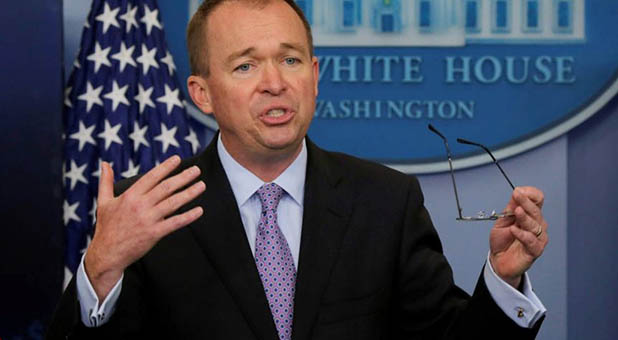Religious Liberty Attorneys Meet With Mick Mulvaney Over ‘Contraception Mandate Rule’
In late May, a draft of an “interim final rule” to reverse Obama administration requirements regarding coverage of contraceptives, including abortifacients, was leaked to the media.
The draft rule, rather than offer narrow exemptions limited primarily to churches and their auxiliaries, appears to offer broad exemptions based upon an individual, business or organization’s religious conscience or moral conviction. This would seem to be in keeping with President Donald Trump’s commitment to religious liberty made during a Rose Garden ceremony earlier that month.
First Liberty Institute attorneys held an on-the-record meeting Monday with officials from the Executive Branch agencies tasked with reviewing the rules related to Obamacare’s “contraceptive mandate,” including White House Director of the Office of Budget & Management Mick Mulvaney. During the meeting, they pressed to have the draft interim final rule be made final as soon as possible.
“Our clients have been litigating against the government’s effort to punish business owners and ministry leaders for following their religious beliefs and moral convictions since 2013,” First Liberty Deputy General Counsel Matthew Kacsmaryk said. “As President Trump recognized in the Rose Garden on May 4, it is time to reaffirm ‘America’s leadership role as a nation that protects religious freedom for everyone.’ That starts by finalizing this draft interim final rule and ending years of litigation.”
First Liberty represents Pastor Chuck Swindoll’s Insight for Living Ministries, four retirement communities and two colleges associated with the Christian and Missionary Alliance Church. On their behalf, its attorneys presented Mulvaney with a letter that outlines their concerns.
The following is the full text of that letter:
First Liberty Institute is a non-profit, public interest law firm dedicated to defending religious liberty for all Americans. We represent several clients, including religious organizations, that have been litigating since 2013 to protect their rights of conscience against HHS’s contraceptive mandate. On behalf of these organizations, we write to express our support of the draft interim final rule.
The draft rule protects entities that object to facilitating some or all contraceptive coverage based upon their sincerely held religious beliefs and/or moral convictions. We believe that a rule such as this one is essential to protect our fundamental rights of conscience.
The draft rule works to fulfill President Trump’s promise to uphold religious liberty. The president’s executive order, issued on May 4, 2017, entitled “Promoting Free Speech and Religious Liberty,” directs the secretary of the treasury, the secretary of labor and the secretary of health and human services to consider issuing amended regulations “to address conscience-based objections to the preventive-care mandate promulgated under section 300gg-13(a)(4) of title 42, United States Code.”
On the release of the executive order, President Trump made the following statement to all those negatively impacted by the HHS contraceptive mandate: “I want you to know that your long ordeal will soon be over … With this executive order, we are ending the attacks on your
religious liberty and proudly reaffirming America’s leadership role as a nation that protects religious freedom for everyone.” The draft interim final rule helps fulfill the president’s promise.
Our religious organization clients desire an amicable resolution that would enable them to pursue their religious missions without being compelled to violate their conscience. We believe the draft interim final rule provides that very resolution.
Specifically, the broad exemptions contemplated by Section 147.131 provide the relief all our clients have long sought. Not only does it correctly provide exemption for religious denominations, it also provides protection for those religious organizations that retain religious beliefs and moral convictions in the operation of their organization, but are not a traditional church or church auxiliary.
By basing the exemption upon the religious beliefs or moral convictions of the entity seeking the exemption, the draft interim final rule contemplates broad protections for the right of conscience—as opposed to religious status—consistent with the First Amendment and the laws
governing conscience throughout the United States.
Although our present clients are religious organizations, they agree that it is fundamental to protect the conscience rights for everyone whose sincere objections to contraception or abortifacient drugs are deeply rooted in religious belief or moral conviction, just as Sections 147.341(a)(1) and (a)(2) contemplate. We hope that the government will respect the conscience rights for all Americans, religious and non-religious alike. We therefore support the broad language of the draft regulation protecting objections on the basis of “religious beliefs” or “moral convictions.”
Moreover, our understanding of the draft interim final rule also resolves any tension between insurance companies and the organizations contracting with them. By tying the exemption to the objecting organization, the draft interim final rule removes any penalty an insurance company may face as it attempts to honor the organization’s religious beliefs or moral convictions in regard to some or all contraceptive coverage.
The draft rule provides the relief necessary for our clients and others that simply wish to continue to provide their services without being compelled by the government to violate their consciences.
We respectfully request that the interim final rule, as drafted, retain the broad conscience protections as described herein in its final form. {eoa}














































